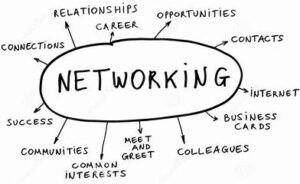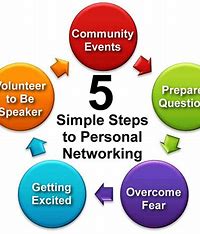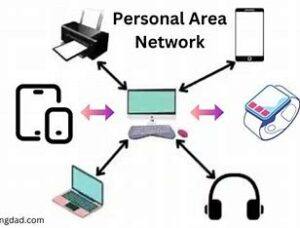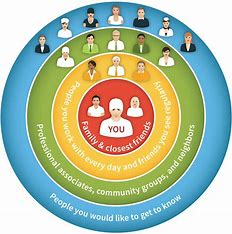Personal networking and online networking, both essential in today’s world, each play unique roles. Personal networking, often face-to-face, means meeting people in real-world settings like events, coffee chats, or professional gatherings. It’s about making genuine connections that can support personal and professional growth.

Online networking, on the other hand, involves building a presence across digital platforms like LinkedIn, Twitter, or industry-specific networks. It’s about connecting with people you may never meet in person—think of it as expanding your circle without geographical limits. This approach has exploded alongside advances in technology, becoming a vital part of any career strategy.
When comparing personal and online networking, it’s clear each offers distinct advantages. Face-to-face interactions build stronger initial bonds and trust. Yet, online networking excels in reach and convenience, allowing for ongoing engagement regardless of location.
click here to start your own online business for free Ced0224
With the rise of hybrid networking, combining in-person interactions with digital connections, professionals can now explore richer opportunities. This approach not only broadens horizons but ensures one leverages both direct and indirect influence.
Statistics back up the power of networking. According to several studies, most jobs and opportunities are found through networking, not traditional applications. This highlights the immense impact of networking, whether personal or online. Each connection is not just a contact; it’s a potential to shape your future success.
Strategies to Excel in Personal Networking
When aiming to excel in personal networking, clear goals are a must. Think about what you want to achieve—maybe it’s landing a new job, finding partners for collaboration, or learning from others in your field. Having defined goals lets you focus your efforts effectively.

Start with crafting a compelling elevator pitch. This short, impactful statement communicates who you are, what you do, and what value you bring. An effective pitch captures interest quickly and sets the stage for deeper conversations.
Choosing the right venues for networking is essential. Professional events, industry conferences, local meetups, and even casual social gatherings can be goldmines for new connections. Explore venues that align with your career aspirations and personal interests.
Building beneficial relationships involves more than just collecting business cards. It’s about genuine engagement and listening actively to others. Avoid the trap of treating networking as a numbers game. Instead, focus on quality over quantity.

Following up is crucial in networking. A simple, thoughtful message post-event can keep the conversation alive. It’s a key part of forming lasting connections, showing that you’re not only interested but also proactive in nurturing relationships.
Navigating the Online Networking Landscape
Navigating the online networking landscape starts with presenting yourself effectively. Your online profile is your digital handshake, whether on LinkedIn, a personal website, or any social platform. Craft a profile that showcases your skills, experiences, and aspirations. Make sure it’s professional yet personal to attract like-minded networks.
Social media is not just for socializing; it’s a powerful networking tool when used strategically. Be active in discussions on platforms relevant to your field. Share insights, comment on industry topics, and don’t shy away from reaching out to people who inspire you. Engage meaningfully; it’s more about building relationships than boosting followers.
Online communities and forums can offer vast networking potential. Sites like Reddit, industry-specific forums, or even Facebook groups can help connect you with professionals worldwide. Be part of conversations, offer your expertise, and learn from the community. Remember, it’s about mutual value exchange.
Email and direct messaging remain direct ways to make professional connections. Craft thoughtful and concise messages when reaching out. Personalize where possible to make a genuine connection. These communications can be the stepping stones to fruitful professional relationships.

Participating in online workshops and webinars opens doors to new contacts and learning. These events often have networking sessions or chats where you can introduce yourself. Plus, they keep you updated with the latest industry trends while expanding your network in a less formal, more interactive setting.
Dual Strategy: Integrating Online and Personal Networking
Merging online and personal networking strategies taps into the strengths of both approaches. When you integrate these methods, you’re not just expanding your reach; you’re enhancing the depth of your connections. It’s about being strategic—using each method where it shines best.

A comprehensive networking plan involves aligning your online and offline efforts. Maintain an updated online profile reflecting your current roles and projects, then use it as a conversation starter in personal meetings. Digital profiles can give people a fuller picture of your professional narrative before they meet you in person.
Personal meetings, whether casual coffee chats or formal interviews, can then delve deeper. Use insights from your digital interactions to fuel conversations. Knowing someone’s online presence can guide you to ask thoughtful questions in person, creating meaningful dialogues.
Technology acts as a bridge between these two worlds. Tools like digital calendars, CRM systems, and networking apps help streamline your efforts—keeping track of meetings, follow-ups, and notes can lead to more effective network management.
Learning from successful individuals who have mastered hybrid networking is invaluable. Case studies and testimonials often highlight tactics that work well. Emulating these strategies while staying authentic to your style can offer a robust blueprint for networking success.
Overcoming Common Networking Challenges
Networking can seem daunting, especially if introversion or anxiety makes the prospect of reaching out feel overwhelming. It’s key to prepare yourself both mentally and logistically. Practicing small talk and having a few ice breakers handy can ease the nerves and help start conversations smoothly.
One of the biggest hurdles is breaking the ice, which sets the tone for any interaction. Simple, open-ended questions about recent industry events or shared interests can get the ball rolling. It’s about showing genuine curiosity, not just ticking a box.
In the realm of online networking, geographical barriers don’t exist, yet they can still pose a psychological hurdle. Embrace digital tools like video conferencing to simulate face-to-face interactions and maintain that personal touch, even virtually.

Maintaining professionalism while still being approachable is crucial in every network you build. It’s a fine balance of being able to showcase your skills while engaging with others on a human level. Approach each encounter with sincerity and a willingness to learn.
Privacy and security, especially online, shouldn’t be overlooked. Always be mindful of the information you share and who you share it with. Use secure platforms for networking and stay informed about digital security practices to protect your personal and professional information.
Maximizing Opportunities: From Networking to Career Advancement
Turning networking into career opportunities involves more than just meeting people; it’s about strategically tapping into these relationships over time. Active engagement with your network keeps you on their radar when opportunities arise, whether it’s a job lead, a reference, or collaboration.
Finding mentors and sponsors through networking can significantly boost your career progression. Mentors provide guidance and insight based on their experiences, while sponsors actively advocate for you within professional circles. Identifying individuals who align with your career goals is a game-changer.

Collaborations or partnerships can be a powerful extension of networking. Joint projects not only expand your professional reach but also showcase your skills in action, making them evident to potential employers or clients.
Networking doesn’t stop at just making connections; maintaining those relationships is paramount. Good etiquette and regular interactions ensure that your network remains robust and healthy. Quick updates or sharing valuable information can keep your network engaged.
Assessing your networking success involves setting measurable goals like increase in job leads, mentoring relationships formed, or successful collaborations. These metrics can provide insight into how effectively you’re using your network to advance your career.
Crafting Your Personal Networking Blueprint
Establishing networking goals that are both attainable and inspiring forms the backbone of a strong networking blueprint. Set specific targets that can guide your actions, such as attending a certain number of events each quarter or reaching out to a set number of new contacts monthly.
Technology offers tools and apps that simplify networking, helping keep track of contacts, events, and follow-ups without hassle. Consider tools like digital business card apps or CRM systems for personal use, ensuring you stay organized and efficient.
Feedback is a critical part of refining your networking approach. Solicit feedback from trusted connections to understand how you are perceived and where you can improve. This reflection and openness to improvement are key to evolving your networking approach.

Authenticity is your secret weapon in building and maintaining connections. People appreciate genuine interaction much more than forced networking attempts. Being yourself allows you to forge sincere and lasting relationships.
An adaptable and sustainable networking plan evolves with your career. Regularly revisit your plan to incorporate new goals and strategies, ensuring your networking activities stay aligned with your current career trajectory and personal growth.
